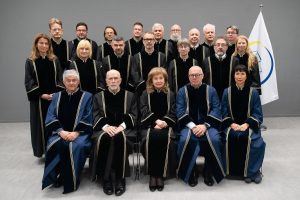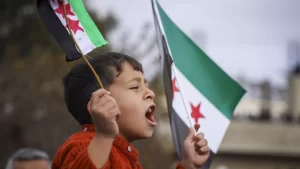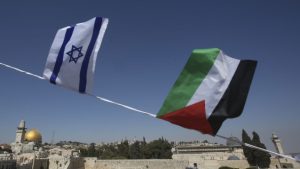
Thirty years after the Srebrenica genocide. The victims’ legal odyssey
Thirty years after the Srebrenica genocide. The victims’ legal odyssey Written for the componente: Armed conflicts Thirty years after
Written for the component: Peace Building and transitions

Syria’s Transitional Government and International Law
Introduction
The ousting of Bashar al-Assad in December 2024 marked a pivotal moment in Syria’s tumultuous history. The subsequent establishment of a transitional government under President Ahmed al-Sharaa has initiated a complex process of political restructuring, societal reconciliation, and international re-engagement. The European Union’s recent statement welcoming this new government underscores the international community’s cautious optimism and the challenges that lie ahead, which include the incorporation of international law to this new government’s manners (New Syrian foreign minister attends UN Security Council in first US appearance since Assad’s fall, Syria holds national dialogue to chart a path after Bashar al-Assad). On March 29, 2025, President Ahmed al-Sharaa announced the formation of a 23-member transitional cabinet, signaling a commitment to inclusivity by appointing individuals from diverse ethnic and religious backgrounds, including Alawite, Druze, and Christian representatives. Notably, Hind Kabawat, a Christian advocate for interfaith dialogue and women’s empowerment. This move aims to bridge sectarian divides and foster national unity. (Syria’s president al-Sharaa forms new transitional government)
However, the government’s composition has raised concerns due to the dominant influence of Hay’at Tahrir al-Sham (HTS), an Islamist group with a contentious history. While HTS’s involvement brings organizational experience, it also prompts apprehension regarding the government’s commitment to democratic principles and human rights. (A tale of two Syrias: free-market opening sows resentment of new rulers). On this note, the National Dialogue Conference held on February 25, 2025, was a significant step towards shaping Syria’s political future and its commitment with the international law principles. (Syria’s current National Dialogue is a missed opportunity, The national dialogue in Syria: A step forward or a concerning …)
Legal Reforms and Institutional Building
In March 2025, President al-Sharaa signed an interim constitution to guide Syria through a five-year transitional period. International law is mentioned explicitly once to say: “These crimes, which constitute war crimes, crimes against humanity, and genocide, constitute a blatant example of the violation of human values and international law”. The constitution enshrines Islamic law as a primary source of legislation while pledging to protect the rights of all ethnic and religious communities. However, it states in Article 12: “The State’s obligations, International treaties: 1. The State shall protect human rights and fundamental freedoms, and guarantee the rights and freedoms of citizens. 2. All rights and freedoms stipulated in international human rights treaties, charters and agreements ratified by the Syrian Arab Republic are considered an integral part of this Constitutional Declaration”. (https://constitutionnet.org/sites/default/files/2025-03/2025.03.13%20-%20Constitutional%20declaration%20%28English%29.pdf )
Reforming Syria’s legal and institutional frameworks is crucial for establishing the rule of law and preventing future abuses. Aligning national legislation with international law, including the Convention against Torture, will be vital. Efforts should focus on creating independent judiciary bodies, ensuring fair trials, and protecting civil liberties. (Justice for the victims of Assad’s atrocities in Syria, Balkees Jarrah). Syria’s transitional government has shown openness to international collaboration in pursuing justice and rebuilding efforts. While Syria is not a party to the Rome Statute, the International Criminal Court (ICC) can still exercise jurisdiction under certain conditions. For instance, the ICC has previously claimed jurisdiction over crimes involving forced deportations into member states, a precedent that could apply to Syrian refugees in countries like Jordan. (The international criminal court should prosecute Syria’s Assad). Reforming Syria’s legal and institutional frameworks is crucial for establishing the rule of law and preventing future abuses. Aligning national legislation with international human rights standards, including the Convention against Torture, will be vital. Efforts should focus on creating independent judiciary bodies, ensuring fair trials, and protecting civil liberties. (Justice for the victims of Assad’s atrocities in Syria, Balkees Jarrah)
International Relations and Regional Dynamics
The European Union has expressed support for Syria’s transitional government, emphasizing the importance of a Syrian-led and inclusive political process. The EU’s readiness to engage with the new government is contingent upon its adherence to principles of peace, inclusivity, and respect for human rights. The EU has also highlighted the significance of the National Dialogue Conference and the need for comprehensive transitional justice to ensure accountability and national reconciliation.
Syria’s reintegration into the international community faces hurdles, particularly concerning its relations with the United States. While the new Syrian Foreign Minister, Asaad al-Shibani, made a notable appearance at the United Nations Security Council, the U.S. remains cautious, maintaining sanctions and expressing concerns over the government’s composition and policies. (New Syrian foreign minister attends UN Security Council in first US appearance since Assad’s fall)
Regionally, Syria’s participation in the upcoming Arab League summit in Baghdad has sparked controversy, especially in Iraq, where political factions are divided over President al-Sharaa’s invitation due to his past affiliations. These developments underscore the complexities of Syria’s regional diplomacy and the challenges of overcoming historical grievances. (Baghdad invites new Syrian president to a summit, sparking political division in Iraq)
Conclusion
International law will play a pivotal role in Syria’s post-conflict reconstruction and peacebuilding efforts. As described above and following the ousting of Bashar al-Assad and the establishment of a transitional government, Syria faces the monumental task of rebuilding its institutions, ensuring justice for past atrocities, and fostering national reconciliation. International legal frameworks and mechanisms offer guidance and support in navigating these challenges.
Transitional justice is essential for addressing the legacy of human rights violations committed during the Syrian conflict. Mechanisms such as truth commissions, reparations programs, and institutional reforms can help acknowledge victims’ suffering and promote healing. The International, Impartial and Independent Mechanism (IIIM), established by the UN, is actively collecting and preserving evidence of war crimes, signaling a commitment to accountability. (Justice for the victims of Assad’s atrocities in Syria)
Despite these opportunities, Syria’s path to peace is fraught with challenges. Political fragmentation, ongoing security concerns, and the need for inclusive governance require careful navigation. Ensuring that all ethnic and religious groups are represented and heard in the rebuilding process is essential for lasting stability. However, international law provides a framework for Syria to address past injustices, rebuild its institutions, and foster national reconciliation. Through transitional justice mechanisms, legal reforms, and international cooperation, Syria can lay the foundation for a peaceful and inclusive future. The commitment of both domestic leaders and the international community, and the incorporation of international law advancements over the last years will be crucial in realizing this vision.
*Editor Note: May 16 of 2025 US Government lift the sanctions against Syria government.
The opinions expressed here do not represent the stance of the CIV or the entities to which the authors are or were affiliated.
Andres B. Munoz Mosquera is a scholar of international law and international relations, attorney-at-law, and former judge specializing in institutional and treaty law, and in the intersection of international law and religion. He holds a PhD from Leiden University, an MA from The Fletcher School of Law and Diplomacy, and JD/LLM degrees from Universities Complutense/Europea. He is a graduate from the NATO Defence College and US Army JAG School. His doctoral dissertation, North Atlantic Treaty Organization: An International Institutional Law Perspective, explores the legal frameworks governing international organizations, using NATO as a case study. He served as the NATO Supreme Headquarters’ fifth Director of the Office of Legal Affairs for eleven years, following thirteen as deputy. He deployed with the UN in Sarajevo and later gather war crimes evidence for the ICTY, represented Spain at the International Telecommunications Union. and provided expert witness to the UK Parliament and the Swiss Ministry of Foreign Affairs. He was consulted for drafting both the US Hamas Human Shields Prevention Act and the Hamas Human Shields Prevention Act. He held fellowships at Marine Corps University and The Fletcher School, and has taught, i.a., at Reichman University, Sorbonne, West Point, and the National Defence University. He has developed the Legal Operations concept. He teaches pro bono at Universidad Catolica de Murcia, and received numerous awards. He has joined the Clough Centre at Boston College as Visiting Scholar.

Thirty years after the Srebrenica genocide. The victims’ legal odyssey Written for the componente: Armed conflicts Thirty years after

The necessity of public and governmental support for transnational justice: the case of the Kosovo Specialist Chambers Written for the

Syria’s Transitional Government and International Law Written for the component: Peace Building and transitions Syria’s Transitional Government and International

An Unlawful Occupation of a Devastated Territory Written for the component:Armed Conflicts: Gaza “The dialogue of the occupying power

From Chaos to Clarity: How Conflict Classification Enhances Peacebuilding Written for the component: Peace Building and Transitions Introduction In today’s

Last Three Years Without serious consequence: Overview of the nature and Challenges of Russia’s War Against Ukraine under The International


To receive more information about our newsletter, please leave us your email address.